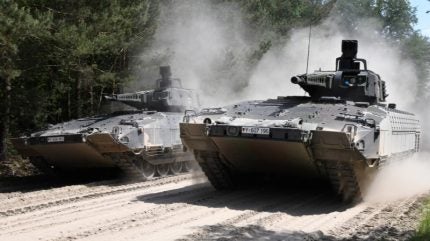
GlobalData’s latest analysis of the aerospace, defence, and security sectors, delivered 2 September in a live-streamed event, reveals significant growth opportunities driven by heightened global tensions. Key players, including Lockheed Martin, Northrop Grumman, and Rheinmetall, are seeing increased demand for advanced defence technologies and military hardware.
Looking ahead, GlobalData expects further growth in the defence sector as countries continue to invest in advanced technologies. Emerging areas like space systems, cybersecurity, and unmanned technologies will likely drive future defence trends globally.
Rheinmetall has been a standout performer, with a planned production of 700,000 artillery shells in 2024, a tenfold increase from 2022. The company is benefiting from increased defence spending in Europe, particularly in response to the conflict in Ukraine.
The war in Ukraine has fuelled demand for artillery, military vehicles, and unmanned systems across Europe. GlobalData notes that Rheinmetall, in particular, has seen significant growth in sales of Puma and Boxer vehicles, with sales up by 28%.
The company’s production of Puma infantry fighting vehicles (IFVs) is particularly noteworthy. These vehicles have been essential in replacing older Marder IFVs that were donated to Ukraine, further enhancing Rheinmetall’s reputation in military vehicle manufacturing.
Rheinmetall’s electronics and air defence systems have also seen significant growth. SkyRanger 30, a mobile air defence system, is increasingly being recognised as an effective countermeasure against unmanned aerial vehicle (UAV) threats, particularly in Ukraine.
Lockheed Martin’s performance in Q2 2024 also showed strong growth, with sales reaching $18.1bn, up 9% from the previous year. Demand for the F-35 fighter jet and GMLRS missiles is driving revenue, particularly in the aeronautics and missile segments.
Northrop Grumman experienced solid growth in Q2 2024, with sales increasing by 7% to $10.2bn. The company’s diverse product portfolio, including the MQ-4C Triton UAV, has seen increased demand, reflecting growing investment in unmanned systems.
Boeing continues to face challenges, with a 15% decrease in revenue compared to Q2 2023. Ongoing issues with the KC-46 tanker and the T-7 trainer jet have negatively impacted the company’s financial performance, despite continued demand for its commercial aircraft.
RTX, formerly known as Raytheon, posted strong sales growth, with revenues rising 8% to $19.7bn. Major contracts for Patriot missiles and Javelin anti-tank missiles are driving growth, while the company continues to invest in advanced missile defence systems and cybersecurity solutions.
Cybersecurity remains a major area of focus for defence companies. GlobalData’s analysis highlights increased investment in IT systems and digital security, as hybrid warfare and cyberattacks become increasingly prevalent in modern defence strategies.
Northrop Grumman and Lockheed Martin are both investing in space defence technologies, recognising the growing importance of space systems in modern warfare. Rheinmetall is also entering the space domain, signalling its ambition to expand into new areas of defence technology.
According to GlobalData, the integration of unmanned systems into military operations is a key trend. Companies like Lockheed Martin and Northrop Grumman are prioritising innovation in this area, focusing on UAVs, loitering munitions, and autonomous systems.
Rheinmetall’s expansion into the US market is another critical development. The company is positioning itself to win contracts for the U.S. Army’s XM30 vehicle program and the Common Tactical Truck (CTT) program, both of which represent significant growth opportunities.
GlobalData’s analysis indicates that despite challenges, companies like Boeing and RTX remain central to Western defence capabilities. Boeing, in particular, continues to face scrutiny over safety concerns, but remains vital in both aerospace and defence sectors.
Defense companies are also focusing on supply chain consolidation and production expansion. Lockheed Martin and Northrop Grumman, for example, have ramped up hiring in engineering and manufacturing roles, reflecting their emphasis on scaling production to meet rising demand.
The European defence market is experiencing rapid growth, particularly as Nato member states, including Finland and Sweden, increase defence spending. Rheinmetall, with its artillery and vehicle production, is well-positioned to benefit from this trend, according to GlobalData.




